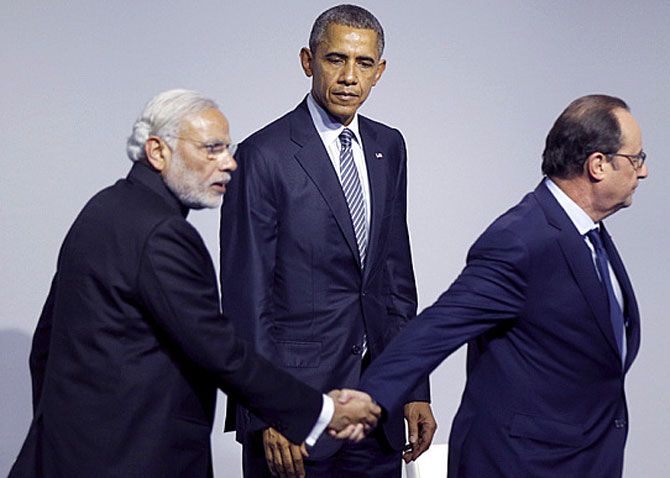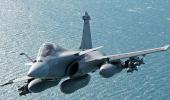French observers point out that Paris had no choice but to issue a denial given the importance of India's Rafale purchase for France's aerospace industry.
Ajai Shukla reports.

The government on Saturday, September 22, rebutted former French president Francois Hollande's explosive allegation that New Delhi had nominated Anil Ambani's Reliance Group as the industrial partner in the purchase of 36 Rafale fighters from France.
'The government has stated earlier and again reiterates that it had no role in the selection of Reliance Defence as the offset partner,' said a statement from the ministry of defence.
The rebuttal came even as the opposition Congress intensified its attack on the Narendra Damodardas Modi government, citing Hollande/s claim.
The MoD statement starts by implying that Hollande was motivated by a 'conflict of interest' relating to his personal life.
'(His) reported statement perhaps needs to be seen in its full context where the French media has raised issues of conflict of interest involving persons close to the former president,' the MoD said.
The implied 'conflict of interest' relates to the Reliance Group's investment of Euro 1.6 million in 2016, in a film produced by Hollande's partner, actress Julie Gayet.
Bharatiya Janata Party spokespersons have already taken the line that Hollande had falsely alleged that New Delhi had done Ambani a favour, in order to deflect charges that he had done the favour himself, as a quid pro quo for the financing extended to Gayet.
French journalists indicate this makes further intervention by Hollande almost inevitable.
On Saturday, Hollande's office said the former president stood by his statement to Mediapart.
Late on Friday night, the French government issued its own carefully worded 'denial'.
Without explicitly contradicting Hollande, it stated: 'The French government is in no manner involved in the choice of Indian industrial partners who have been, are being, or will be selected by French companies. In accordance with India's acquisition procedure, French companies have the full freedom to choose the Indian partner companies that they consider to be the most relevant...'
French observers, speaking anonymously, point out that Paris had no choice but to issue a denial given the importance of India's Rafale purchase for France's aerospace industry.
However, they underline its linguistic ambiguity. "The statement says Paris is not involved in selecting the Indian offset partner. This in no way contradicts Hollande's statement that New Delhi selected Ambani," said one observer.
The second part of the French government statement, that 'in accordance with India's acquisition procedure, French companies have the full freedom to choose the Indian partner companies...' is also a bland recitation of the procurement procedure.
"This does not address Hollande's implicit allegation that New Delhi violated its own acquisition procedure," pointed out the observer.
Meanwhile, Dassault, which had refused to comment for the Mediapart report, has also issued a statement contradicting Hollande.
'Dassault Aviation has decided to make a partnership with India's Reliance Group. This is Dassault Aviation's choice...' it said.
The MoD statement unusually cited 'media reports' to argue that the Dassault-Reliance partnership was not related to the 36 Rafale purchase. Instead, it went back to 2012, when Dassault was competing in the tender for 126 medium multi-role combat aircraft (MMRCA).
'It has been reported that a JV (joint venture) between Reliance Defence and Dassault Aviation came into being in February 2017. This is a purely commercial arrangement between two private companies,' the MoD said.
'Incidentally, media reports of February 2012 suggest that Dassault Aviation, within two weeks of being declared the lowest bidder for procurement of 126 aircraft by the previous government, had entered into a pact for partnership with Reliance Industries in defence sector,' the MoD added.
In its statement, Dassault cites Reliance Group's ownership of land abutting a runway in Nagpur as a reason for deciding to partner Anil Ambani.
'Dassault Aviation and Reliance have built a plant in Nagpur for manufacturing parts for Falcon and Rafale aircraft. The Nagpur site was chosen because of the availability of land with direct access to an airport runway, an essential condition of aeronautic activities,' Dassault said.
Reliance Group's involvement in the Rafale controversy relates to its selection as one of Dassault's offset partners.
In all Indian defence procurements worth more than Rs 20 billion, an offset policy requires the overseas vendor to plough back 50 per cent of the contract value into Indian defence production.
Euro 3.9 billion worth of offsets arise from the Euro 7.8 billion contract for 36 Rafale fighters. However, the Reliance Group says it has benefited only from Euro 778 million worth of offsets orders from Dassault.
This latest twist in the Rafale controversy was triggered on Friday when the well-regarded French investigative Web site Mediapart published an interview with Hollande, in which he said: 'It was the Indian government that proposed this group (Reliance), and Dassault which negotiated with Ambani. We did not have a choice, we took the interlocutor who was given to us.'











 © 2025
© 2025